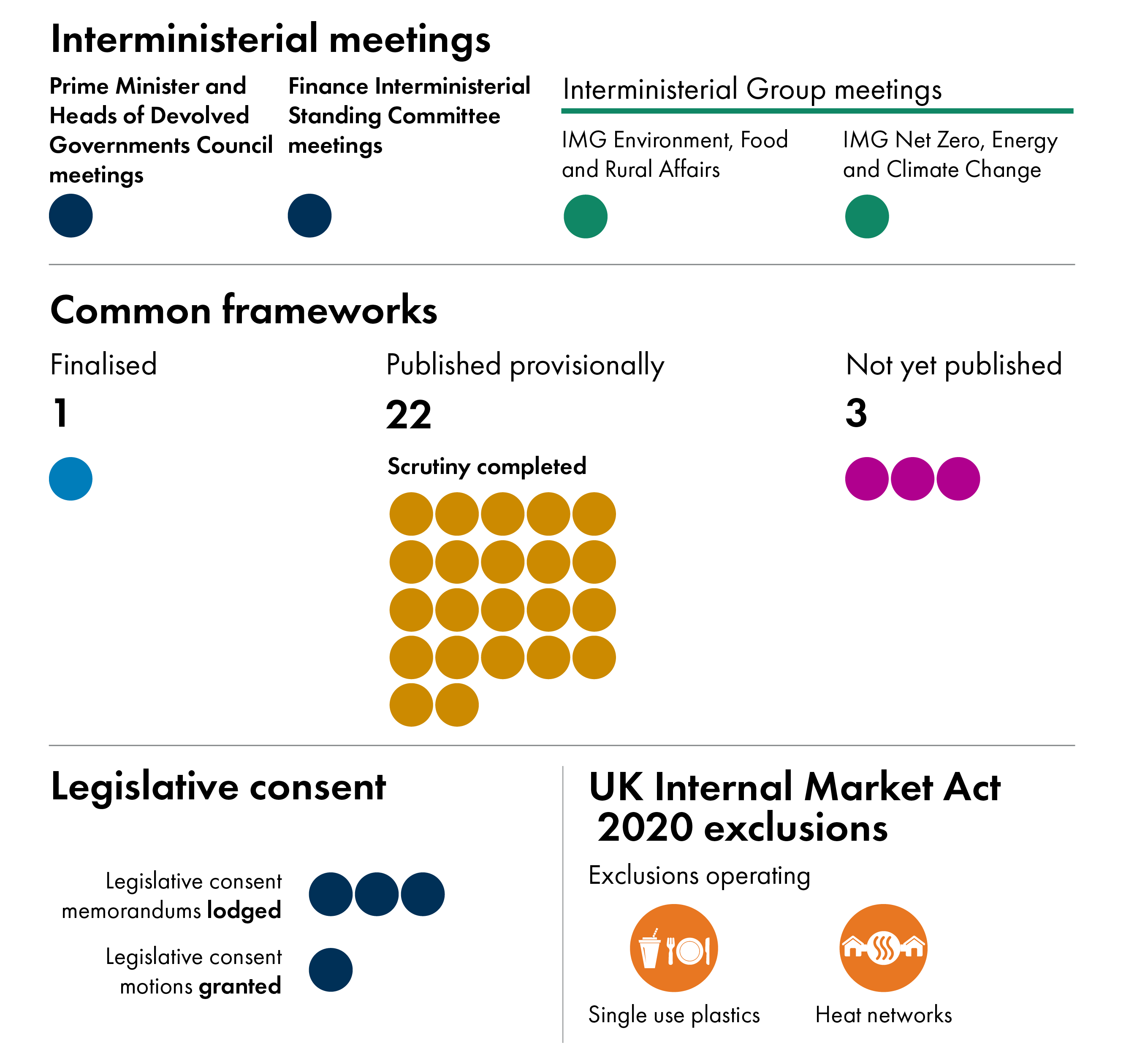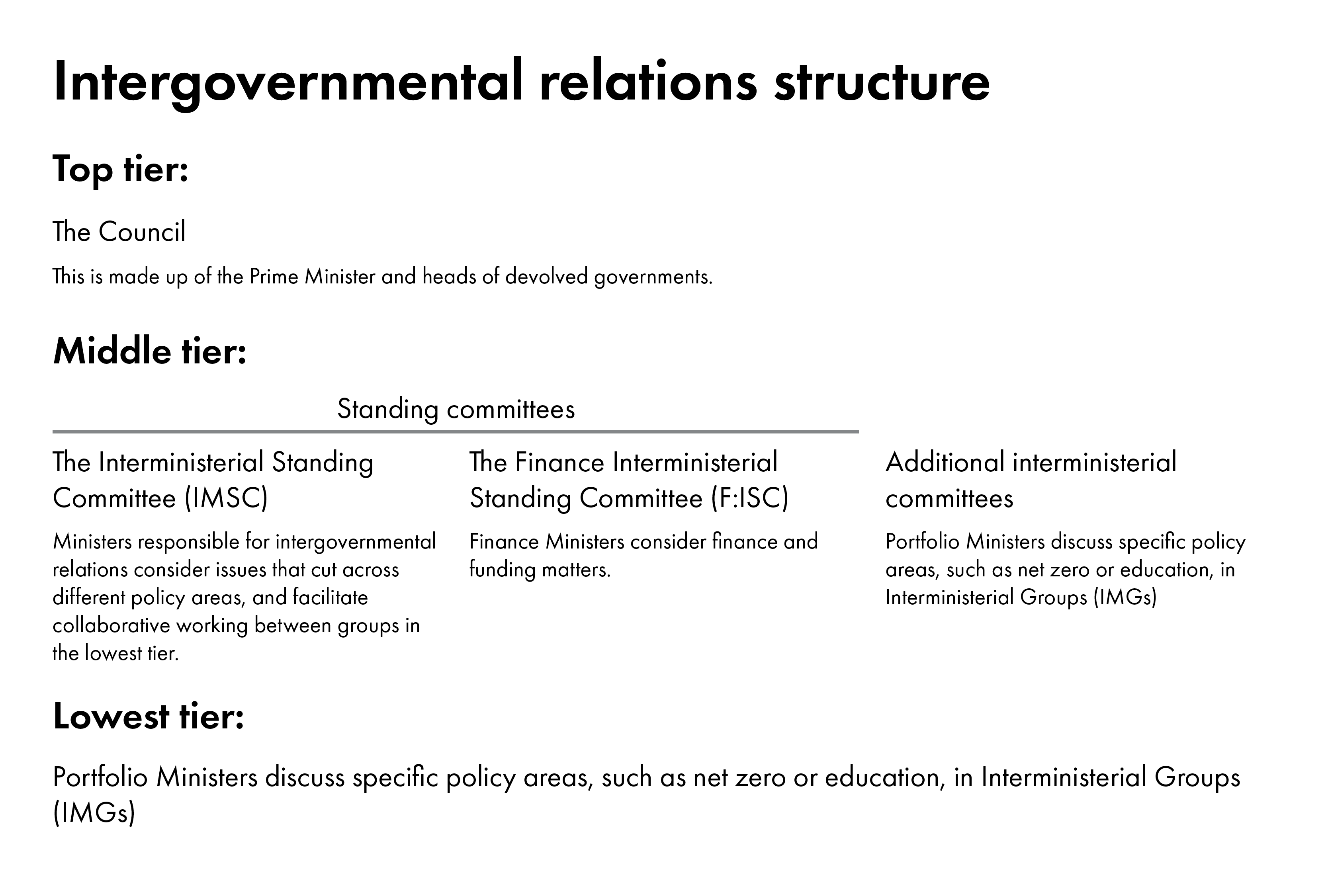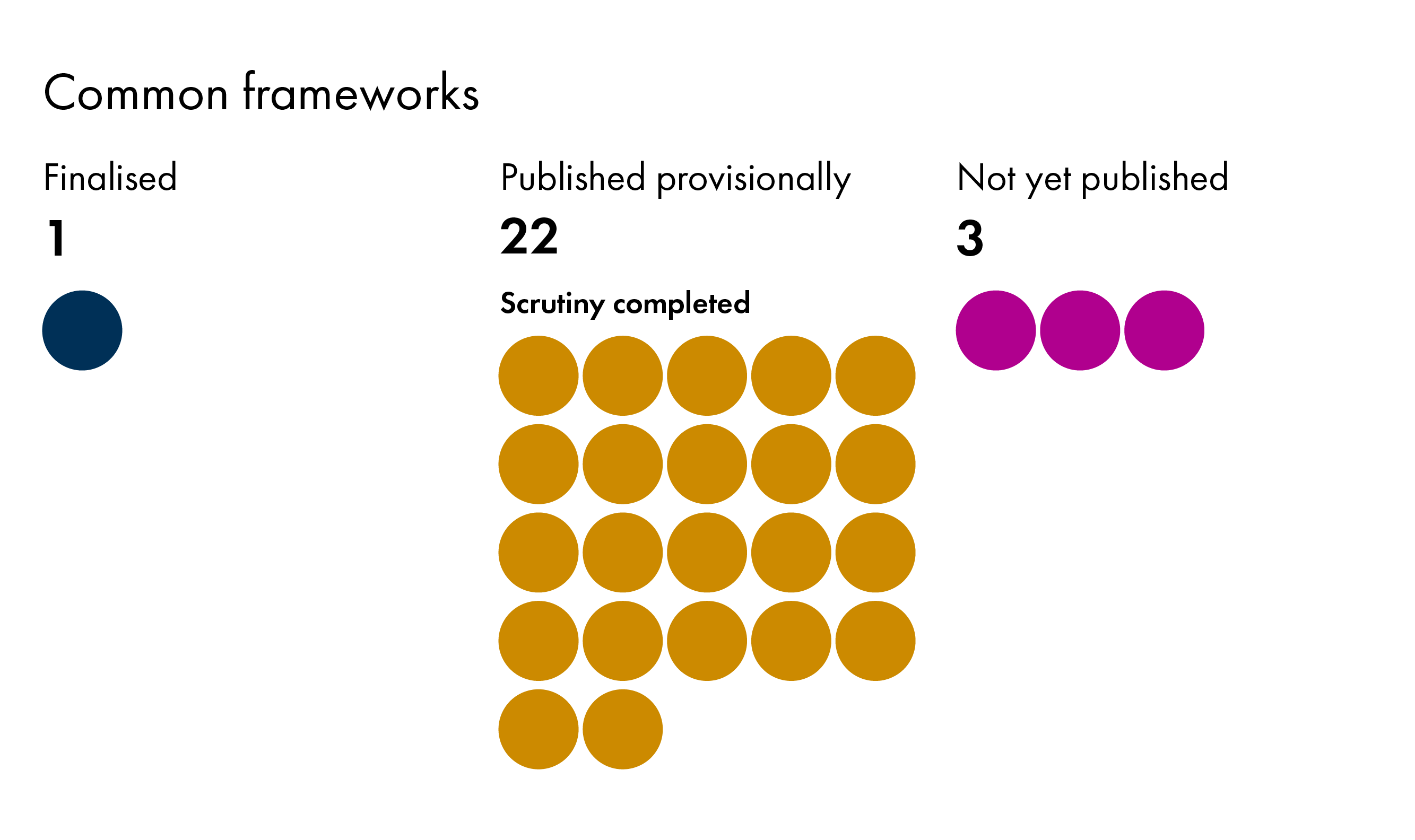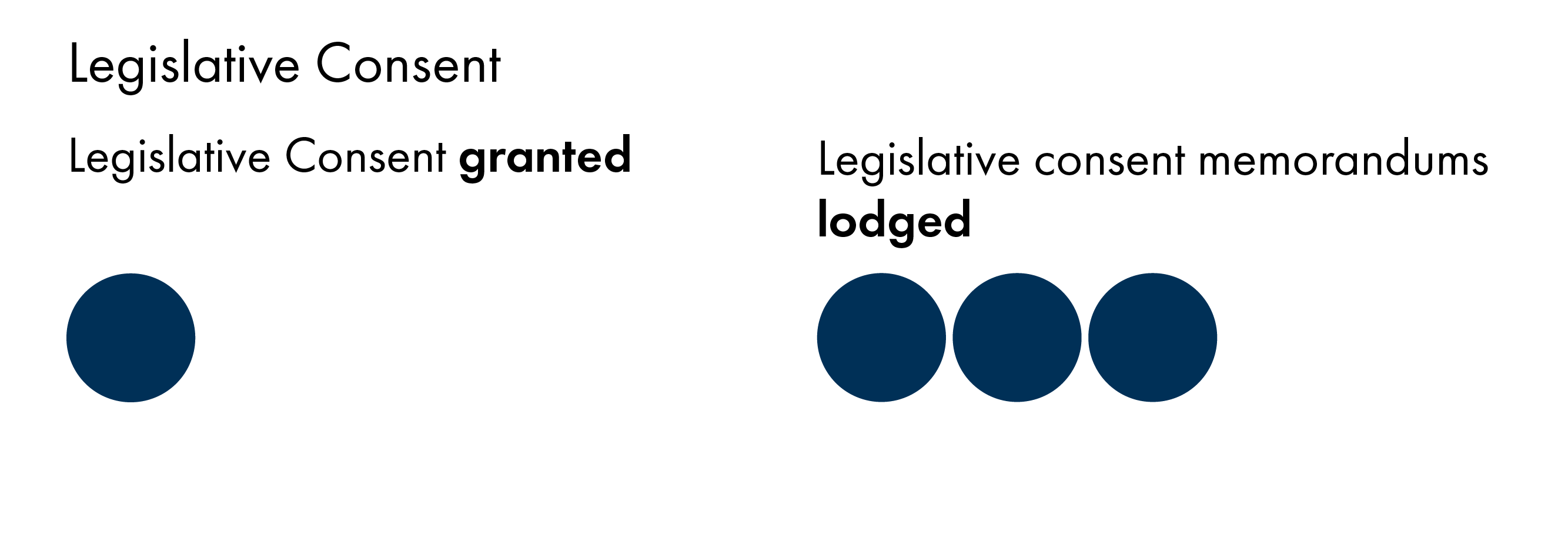Intergovernmental activity update Q4 2024
This update gives an overview of intergovernmental activity of relevance to the Scottish Parliament between the Scottish Government and the UK Government, the Welsh Government, and the Northern Ireland Executive during quarter four (October to December) of 2024.
Introduction
SPICe publishes quarterly updates to give an overview of intergovernmental activity. 'Intergovernmental activity’ refers to work between governments – in a Scottish context between the Scottish Government and the UK Government or other devolved governments. It can include discussions on areas of mutual interest, policy development, and policy implementation. Read more about what intergovernmental activity is and why awareness of it is an essential element of parliamentary scrutiny on our SPICe blog. SPICe has also launched an intergovernmental activity hub that collates information on intergovernmental activity of relevance to the Scottish Parliament.
Updates are published on the last Thursday of the month following the end of the reporting period. This update reflects information available at the time of publication.
Highlights

Intergovernmental activity
Formal intergovernmental interactions take place under the following structure, which was established in January 2022.

See a SPICe blog for more information on how the new structure operates.
Interministerial meetings

Prime Minister and Heads of Devolved Governments Council
The Prime Minister and Heads of Devolved Governments Council ('the Council') met on 11 October 2024. This was the first meeting of the Council since its inaugural meeting on 10 November 2022. The Chancellor of the Duchy of Lancaster (Pat McFadden MP) as the UK Government Minster with responsibility for intergovernmental relations was in attendance with Prime Minister Keir Starmer MP, First Minister of Scotland John Swinney MSP, First Minister of Wales Eluned Morgan MS, First Minister of Northern Ireland Michelle O'Neill MLA, and Deputy First Minister of Northern Ireland Emma Little-Pengelley MLA. The minutes of the meeting, agreed to by all four governments, state:
The Prime Minister and heads of the devolved governments discussed working together to grow the economy and to make the UK a clean energy superpower. Ministers recognised the importance of skills and infrastructure to attract investment and create growth. Ministers agreed to strengthen joint working to reflect more fully the investment opportunities that exist in all parts of the UK on the international stage.
The Chancellor of the Duchy of Lancaster and Minister for Intergovernmental Relations led a discussion on intergovernmental relations, outlining the importance of strengthening working relationships through ongoing dialogue to deliver shared priorities. The Prime Minister said he looked forward to meeting again in this format in the spring.
The meeting of the Council was held on the same day as the inaugural meeting of the Council of Nations and Regions, established by the current Prime Minister. The Council of Nations and Regions involves the mayors of England's combined authorities in addition to the Prime Minister and First Ministers of the three devolved governments. It is not clear how or whether the Council of Nations and Regions will interact with the intergovernmental relation system's Council. The House of Commons Library published a briefing on the origins of the Council of Nations and Regions on 12 September 2024.
The UK Government published a terms of reference for the Council of Nations and Regions on 17 October 2024 and minutes of the inaugural meeting. The minutes indicate the meeting involved discussions on attracting long-term inward investment and an update on the UK's Modern Industrial Strategy. The Council of Nations and Regions is expected to meeting biannually and reconvene in "Spring 2025".
Finance: Interministerial Standing Committee
The Finance: Interministerial Standing Committee held a meeting on 3 October 2024, marking its first meeting since the UK Parliament elections on 4 July 2024. The minutes of the meeting indicate:
All Ministers acknowledged a shared interest in resetting relationships and working collaboratively to drive economic growth and deliver the vital public services on which our citizens depend.
Ministers discussed the current challenging fiscal and economic context as well as fiscal plans and budgetary flexibilities. Funding for 2024-25 as well as the upcoming multi-year UK Spending Review and Autumn Budget were also discussed.
Ministers went on to discuss collaborative working and shared priorities.
Interministerial Group for Net Zero, Energy and Climate Change
The Interministerial Group for Net Zero, Energy and Climate Change met on 17 October 2024 and was attended by a Minister from each of the four governments. The group discussed each government's priorities and key milestones for meeting "Net Zero ambitions and decarbonising the power sector". The minutes also indicate that the group approved a paper on future collaboration and agreed to "refresh" the group's terms of reference, which were last updated on 8 July 2021, before its next meeting.
Interministerial Group for Environment, Food and Rural Affairs
The Interministerial Group for Environment, Food and Rural Affairs held a meeting on 18 November 2024 covering a wide range of matters.
The minutes of the meeting, agreed to by each of the four governments, indicate that Ministers discussed the UK Budget presented to the UK Parliament House of Commons on 30 October 2024. The minutes state:
Ministers from the devolved governments were disappointed that the funding settlement did not reverse real term cuts or provide multi-year certainty and advised that Barnett allocations were not appropriate given the significant role of agriculture and marine sectors in Scotland, Wales and Northern Ireland. Ministers discussed the implications of the removal of ring-fencing, introduction of new tax provisions, and the concerns within the farming community, urging the UK government to engage in four-nation dialogue and with stakeholders on addressing impacts arising for the agriculture, rural and marine sectors.
Ministers agreed on 18 November 2024 to hold a series of "detailed policy discussions over the next year on areas for enhanced collaboration between the 4 governments". The minutes indicate that the discussion may potentially cover food security, environmental land management, waste reduction, circular economy, water pollution, biosecurity, trade barriers, biodiversity loss, nature recovery, and bovine TB.
The group also discussed the implementation of the Border Target Operating Model and potential negotiations on developing a UK-EU sanitary and phytosanitary/veterinary agreement. The minutes state:
[...] ministers supported addressing barriers to trade with the EU and agreed the need for continuing close intergovernmental engagement at technical, policy and ministerial levels as the work progressed.
The minutes note that a wide range of other business was discussed and included "considerations on banning the sale of horticultural peat".
Common frameworks
Common frameworks are intergovernmental agreements which set out how governments will work together to make decisions about policy in certain devolved policy areas, in particular decisions about policy divergence. Common frameworks were originally intended to be used to consider matters which were former EU competences, however, some also state that they may be used to consider related matters within the wider policy area. You can read more about what common frameworks are on our intergovernmental activity hub.
No new framework agreements were published during the reporting period. The image below provides an update on frameworks relevant to Scotland and scrutiny of frameworks at the Scottish Parliament.

One common framework, Hazardous Substances (Planning), has been finalised. Scrutiny of all currently provisionally published frameworks that apply to Scotland has been completed at the Scottish Parliament. Three more planned frameworks that apply to Scotland remain unpublished: the Zootechnics Framework, the Mutual Recognition of Professional Qualifications Framework, and the Services Directive Framework.
The UK Government announced in a written statement to the UK Parliament House of Commons on 12 December 2024 that it aims to finalise the Common Frameworks programme by Easter 2025.
UK internal market
The UK Internal Market Act 2020 is UK-wide legislation about the flow of goods and services. You can read more about the Act's provisions in our SPICe briefing and a SPICe blog.
UK Government review of the United Kingdom Internal Market Act 2020
The UK Internal Market Act 2020 contains a statutory requirement for a Government review to be completed by December 2025. The UK Government announced in a written statement to the UK Parliament House of Commons on 12 December 2024 that it would be completed by summer 2025. The written statement indicates:
As a statutory minimum, this review must cover use of the powers in Part 1 (Goods) and Part 2 (Services), including the powers to add, delete or amend exclusions from the scope of the Act, and the arrangements relating to the use of the Office of the Internal Market to perform the functions in Part 4 of the Act (covering independent advice and monitoring of the UK Internal Market) .
However, the Government recognises the importance of fully considering the operation of the Act beyond the narrow statutory requirements. Therefore, the Government will broaden the scope of the review to include the practical operation of parts 1, 2 and 3 of the Act, including inviting views on the process for considering exclusions from the Act, and the role and functions carried out by the Office for the Internal Market as set out in Part 4. We will directly engage the Devolved Governments in conducting the Review.
The UK Government also announced in the written statement that it would deliver a "package of measures to demonstrate a more pragmatic approach" to the management of the UK internal market. One of the commitments in this package is:
[...] acknowledging the benefits of policy innovation and shared learning on policy development and implementation, while enabling the smooth functioning of the UK internal market.
The UK Government launched a consultation seeking views on the operation of certain aspects of UKIMA as part of the review of UKIMA. The consultation is due to close on 3 April 2025.
UK Internal Market Act exclusions
A process has been established by which the UK Government and devolved governments can consider exclusions to the market access principles of the UK Internal Market Act 2020 ('UKIMA'). Read more about the interaction between the exclusions process and common frameworks in our SPICe blog.
.png)
Deposit Return Scheme
Discussions about a UKIMA exclusion relating to a Scottish Deposit Return Scheme for drinks containers took place during 2023. The UK Government offered a temporary, narrower exclusion than the one requested by the Scottish Government, which the Scottish Government cited as the reason for its delay of the scheme. The Scottish Government subsequently decided to align its scheme with the UK-wide scheme. The UK Government, Scottish Government, Welsh Government and Northern Ireland Executive Department of Agriculture, Environment and Rural Affairs agreed in a joint policy statement to launch the UK-wide deposit return scheme in October 2027. See SPICe blogs for background about the scheme and further information about intergovernmental discussions regarding an exclusion. The Q1 2024, Q2 2024 and Q3 2024 intergovernmental activity updates summarise further developments that have taken place in 2024.
The Welsh Government announced on 18 November 2024 that it would not be proceeding with the joint process for deposit return schemes in the UK and would pursue its own scheme that includes glass. Huw Irranca-Davies MS, Deputy First Minister of Wales and Cabinet Secretary for Climate Change and Rural Affairs in the Welsh Government, in a written statement on 18 November 2024 indicated:
In partnership with the UK and Devolved Governments, we have been working to initiate a joint process to appoint the Deposit Management Organisation for our respective schemes later this month. However, in the time available it has not been possible to address the issues to the operation of devolution caused by the United Kingdom Internal Market Act 2020, inherited by the UK Government from the previous administration. This unfortunately means that we are not able to proceed with the joint process.
The UK Government published an update on the deposit return scheme following the Welsh Government announcement and stated:
With Wales already ranked second in the world for recycling, they are in a unique position of implementing a scheme into an already high recycling nation. For this reason, they prefer to continue to work on a scheme that is right for their context.
We will continue to work in partnership with the Welsh Government, as they make decisions regarding a Deposit Return Scheme in Wales.
The Draft Deposit Scheme for Drinks Containers (England and Northern Ireland) Regulations 2024 were laid in the UK Parliament on 25 November 2024 (and subsequently approved on 16 January 2025). The Scottish Government has previously indicated that it will continue to legislate separately to implement the scheme in Scotland. Mairi McAllan MSP, Cabinet Secretary for Net Zero and Energy, in correspondence to the Net Zero, Energy and Transport Committee stated on 2 May 2024:
We will make amending legislation, where required, to give effect to the policy positions set out in the Joint Policy Statement once the UK Government has passed their legislation. Any such amending legislation will require approval by the Scottish Parliament.
The Scottish Government confirmed that it would be continuing its participation in the UK process with England and Northern Ireland on 17 December 2024. Gillian Martin MSP, Acting Cabinet Secretary for Net Zero and Energy, responded to a written question in the Parliament and stated:
[...] the UK scheme remains the only practical option available to Scotland. The Scottish Government is committed to seeing it delivered by October 2027 and will continue to work to that end. We opened applications for a DRS scheme administrator alongside England and Northern Ireland at the start of December.
Glue traps
The Wildlife Management and Muirburn (Scotland) Act 2024 provides for bans on the purchase, sale, and use of glue traps. The Q1 2024 intergovernmental activity update and SPICe briefing on the then Bill ahead of Stage 3 debate summarises the discussions about glue traps and a potential exclusion during the then Bill's parliamentary process.
The previous UK Government did not agree to a UKIMA exclusion. Shona Robison MSP, then Deputy First Minister and Cabinet Secretary for Finance, referenced a letter from the UK Government Secretary of State for Environment, Food and Rural Affairs dated 26 March 2024. The letter communicated the UK Government's view:
The UK Government does not consider that the evidence presented demonstrates that a ban on the sale of glue traps would be substantially more effective than a ban focused on their use and possession. Therefore, the UK Government does not believe that an exclusion under the UKIM Act is necessary to achieve the policy aims of restricting the use of these traps in Scotland.
In response to the communication that an exclusion to UKIMA would not be agreed, Shona Robison MSP stated in a letter dated 31 March 2024:
It is not credible to claim that this decision is intended to avoid trade barriers and unnecessary disruption of economic and trade flows, given that in this case, the trade and economic impact is negligible to non-existent.
The UK Government written statement to the UK Parliament House of Commons on 12 December 2024 included an announcement of a package of measures aimed at demonstrating "a more pragmatic approach" to the management of the UK internal market. One of the measures relates to the sale of rodent glue traps. The statement indicates the package of measures includes:
Agreeing an exclusion from the UK Internal Market Act’s market access principles regarding the sale of rodent glue traps, in response to the Scottish Government’s previous proposal, as this Government recognises this proposal has a minimal economic impact on trade within the UK.
Legislative consent

According to the Sewel Convention, the UK Parliament will not normally legislate on devolved matters without the consent of the Scottish Parliament. The Scottish Parliament’s standing orders set down rules which apply where UK primary legislation requires the Parliament’s consent under the Sewel Convention. They apply where UK primary legislation makes ‘relevant provision’, which means provision which applies to Scotland in any of the following ways:
for any purpose within the legislative competence of the Scottish Parliament
to alter the legislative competence of the Scottish Parliament
to alter the executive competence of the Scottish Ministers.
When any of the criteria on relevant provision are fulfilled, a member of the Scottish Government is obliged to lodge a legislative consent memorandum. A legislative consent memorandum, amongst other things, sets out the Scottish Government's view on whether the Parliament should grant legislative consent.
Following the lodging of a legislative consent memorandum, members of the Scottish Parliament may vote on a motion on legislative consent to grant or withhold consent for the Bill.
Find out more about legislative consent on the Scottish Parliament's website.
During the reporting period, one motion granting legislative consent for the Passenger Railway Services (Public Ownership) Bill was approved. The Bill received Royal Assent on 28 November 2024 and is now the Passenger Railway (Public Ownership) Act 2024.
The Scottish Government lodged 3 legislative consent memorandums.
| Bill title | Date memorandum lodged | Consent recommendation by Scottish Government |
|---|---|---|
| Tobacco and Vapes Bill | 21 November 2024 | Consent recommended |
| Data (Use and Access) Bill | 22 November 2024 | Consent recommended |
| Employment Rights Bill | 11 December 2024 | Consent recommended |
Further information
Information within this intergovernmental update is primarily based on the following sources:
The UK Government intergovernmental relations website contains minutes of interministerial groups and standing committees. Minutes of other intergovernmental meetings are not currently published and hence are not reflected in this update.
The UK Government common frameworks website contains common framework agreements.
The Scottish Parliament legislative consent website lists legislative consent memorandums and associated motions.
Further information on intergovernmental activity can be found on our intergovernmental activity hub and:
House of Commons Library briefing on intergovernmental relations
UK Government transparency reports on intergovernmental relations
Senedd Legislation, Justice and Constitution Committee Monitoring reports
Northern Ireland Assembly Brexit and Beyond newsletters.